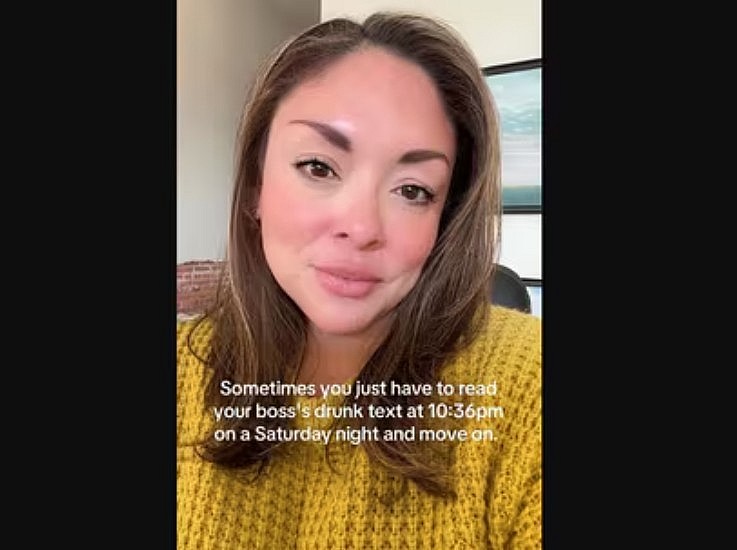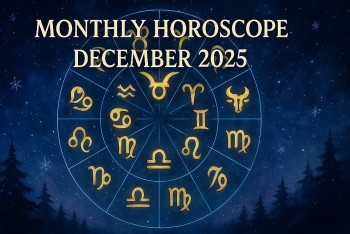Who is Kristin McCarley? Texas Single Mom Fired by Boss in Late-Night ‘Drunk’ Text
 Who is Joe Lewis: The Billionaire Behind Tottenham, His Rise, Fall, and Trump’s Pardon Who is Joe Lewis: The Billionaire Behind Tottenham, His Rise, Fall, and Trump’s Pardon British billionaire Joe Lewis, former Tottenham Hotspur owner, was pardoned by Donald Trump in 2025 after pleading guilty to insider trading—a dramatic turn in the ... |
 Who Is Lawrence Reed? A Deep Dive into the Man Charged with Terrorism After a Chicago Train Arson Who Is Lawrence Reed? A Deep Dive into the Man Charged with Terrorism After a Chicago Train Arson On November 19, 2025, federal prosecutors unveiled an extraordinary charging document: 50-year-old Lawrence Reed of Chicago was charged with committing a terrorist attack on a ... |
A Texas mother says she was abruptly fired after receiving a late-night text message from her boss telling her not to come into work the following Monday. The message, which she later described as a “drunk” text, has sparked national debate about workplace professionalism, employee rights and the growing trend of impersonal digital firings.
This article breaks down who the employee is, what happened, what experts are saying, and why the public reaction has been so strong.
 |
| Kristin McCarley |
Who Is the Texas Mom at the Center of the Story?
The woman at the center of the viral case is Kristin McCarley, a real estate agent and single mother living in East Texas. She has worked in property management and real-estate sales, a field where schedules can run long hours, weekends and evenings.
According to McCarley, she had no warning, no performance meeting and no recent conflict with management. She says the text she received came completely out of the blue. Her employment had appeared stable, and she had recently posted on social media about balancing work and parenting responsibilities.
Shortly after receiving the messages, McCarley recorded a TikTok video explaining what had happened. The video quickly gained traction and turned a private employment dispute into a national conversation. Millions saw it. Thousands commented. Many expressed outrage. Others shared their own stories of impersonal dismissals and late-night work messages that crossed basic boundaries.
What Exactly Happened?
The timeline of events, based on McCarley’s description and the screenshots she shared, is as follows:
Saturday, 10:36 p.m.
Her boss sends a text message that reads:
“Do not come in Monday. I’ve made changes to the office. I have to let you go.”
The message had a typo, which led some viewers to speculate that the sender may have been impaired.
Sunday, 1:07 a.m.
A second text arrives. This time, it includes a screenshot of a photo from McCarley’s social media.
The screenshot shows McCarley with a friend smiling outdoors.
No explanation is provided.
No formal HR documentation accompanies the message.
Hours later: The TikTok goes live
McCarley posts a reaction video explaining that she believes her boss was drunk or at least acting impulsively, given the hour, tone and lack of clarity in the messages.
After the video spreads
Millions of viewers share their opinions. Many call the firing unprofessional. Others encourage McCarley to speak with a labor lawyer. Some argue the employer may have violated ethical norms, even if the action was technically legal under Texas at-will employment laws.
To date, the employer has not issued any public statement explaining the reason for the termination or addressing the viral reaction.
Why the Case Struck a Nerve
Several factors explain why this story took off so quickly.
1. The method of termination
Being fired by text is already controversial, but being fired late at night over the weekend makes it feel even more careless. Terminations usually come through meetings, HR notices, or at minimum a daytime phone call. A late-night text creates the appearance of emotional impulsiveness rather than professional decision-making.
2. The implication of intoxication
Many viewers believe the boss may have been drinking or otherwise impaired due to the timing, typos and tone. McCarley herself suggested this possibility. Even without proof, the idea itself fuels public anger.
3. Social media visibility
Posting the texts online allowed a private workplace decision to become a public conversation. This is a growing trend. Employees increasingly turn to platforms like TikTok to expose workplace behavior they believe is unfair.
4. The emotional dimension
McCarley is a single mother. For many people, the idea of a parent losing their job by an abrupt text message feels cold and disrespectful.
5. The broader pattern
This story taps into a deeper fear: the rise of impersonal firings in the digital era. More employees than ever report being laid off by email, group Zoom call or automated notification. The idea that a boss can dismiss someone with little thought adds a layer of societal anxiety.
Legal Context: What Does Texas Law Say?
Texas is an at-will employment state. That means:
-
An employer can fire an employee at any time.
-
No reason is required.
-
The reason, even if unfair, can still be legal.
-
An employee can also quit at any time.
However, there are still boundaries.
Termination cannot violate federal or state law.
Firing someone for reasons related to race, gender, disability, pregnancy or other protected characteristics is illegal.
Documentation still matters.
While a text message may count as written notice, it can be used as evidence in a wrongful termination or retaliation claim.
The late-night timing could raise questions regarding the employer’s state of mind and whether proper procedures were followed.
Retaliation is prohibited.
If the firing was related to a complaint McCarley made or a protected workplace action, the firing could be unlawful.
The screenshot raises questions.
If the firing was based on a harmless social-media photo, a lawyer may ask whether the employer acted out of personal bias, unfair judgment, or inappropriate monitoring.
At this point, McCarley has not announced any legal action. But many employment attorneys believe the situation at least warrants a consultation.
Workplace Experts Weigh In
HR and workplace-culture specialists point to this incident as a warning sign of a larger issue:
Growing reliance on digital shortcuts
Managers who want to avoid uncomfortable conversations may default to text messages. Experts say this erodes trust and leaves employees feeling disposable.
Lack of communication training
Many supervisors are not trained in empathy-based management. Firings handled poorly can damage company culture, discourage top talent and increase turnover.
Risk for businesses
Reputational harm travels fast. Companies risk long-term brand damage if an employee exposes a thoughtless or humiliating firing process.
The line between personal and professional
Sending a termination text at 10:36 p.m. also blurs boundaries. Experts encourage employers to set communication hours and enforce internal policies to avoid unprofessional late-night messages.
How the Public Has Responded
Public reaction has been overwhelmingly sympathetic toward McCarley. Comments include:
-
“This is not how anyone should lose a job.”
-
“Even if it’s legal, it’s not humane.”
-
“You deserve better. Talk to a lawyer.”
-
“This is why HR exists. Not to text employees at midnight.”
The viral discussion highlights how society views employer responsibility not just in legal terms, but moral ones. People expect employers to act with dignity, clarity and respect, even in difficult moments.
Many viewers also felt a sense of shared frustration, saying they too had been fired through email or other impersonal channels.
The case tapped into a broader cultural fatigue with cold corporate behavior.
What Happens Next?
Several possibilities are on the table:
1. McCarley may seek legal advice.
She has the screenshots, timestamps and digital record needed for a consultation.
2. The employer may issue a public response.
If media pressure increases, the company might clarify their reasoning or argue there was no wrongdoing.
3. The discussion may influence HR policies elsewhere.
This story could push other companies to review their termination procedures.
4. McCarley may share updates online.
Given the size of her audience, any new detail she shares is likely to spread quickly.
5. The incident may inspire broader debate on digital firings.
As workplaces become more remote and communication tools more casual, workers may demand clearer guidelines and limits.
What Workers And Employers Can Learn From This
For employees
-
Save documentation.
-
Know your rights under at-will employment law.
-
Seek legal advice if the situation feels discriminatory, retaliatory or unethical.
-
Understand that viral exposure can shift public opinion, but legal outcomes rely on documented facts.
For employers
-
Never terminate an employee by late-night text.
-
Use structured, documented processes.
-
Provide a clear reason and next steps.
-
Maintain professionalism at all hours.
-
Train managers on communication, conflict, and empathy.
Poorly managed firings cost companies more than they save.
FAQs About the Texas “Drunk Text” Firing Case
1. Was it legal to fire her by text?
In Texas, yes. At-will employment allows termination by almost any method. But legal does not always mean appropriate or smart.
2. Is a text message considered official notice?
It can be. There is no law that says notice must be delivered in person or through HR paperwork, though written documentation is recommended.
3. Why is the screenshot relevant?
It suggests the boss may have been judging something on her social media. If the reason relates to a protected category or unfair personal bias, it could become relevant in a legal case.
4. Could this be wrongful termination?
Only if the firing violated discrimination laws, retaliation protections, or the terms of a contract. Based on public information, that has not yet been established.
5. Can she sue simply because the firing was unprofessional?
Not typically. Lawsuits require legal violation, not just disrespect or poor communication.
6. What should she do next?
Experts say documenting everything, requesting her personnel file and speaking with an employment attorney are logical next steps.
7. Why did the story go viral?
The unusual timing, suspected “drunk” tone, lack of professionalism and the fact that she is a single mom created strong emotional response.
8. Could the employer face consequences?
Legally, maybe not.
Reputationally, absolutely.
Public opinion often shapes how businesses behave going forward.
9. Is this part of a larger trend?
Yes. More workers report digital or automated firings. The conversation around ethical offboarding is growing.
Final Thoughts
The Texas “drunk-text firing” case is more than a viral moment. It captures how fragile workplace trust can be in the digital age. Employees expect basic dignity. Employers who fail to provide it risk both legal headaches and cultural backlash.
McCarley’s story resonates because it reflects a shared truth many workers feel: losing your job is hard enough. Losing it through a careless late-night text hits differently. And it signals a workplace culture problem that goes far beyond any single employer.





















